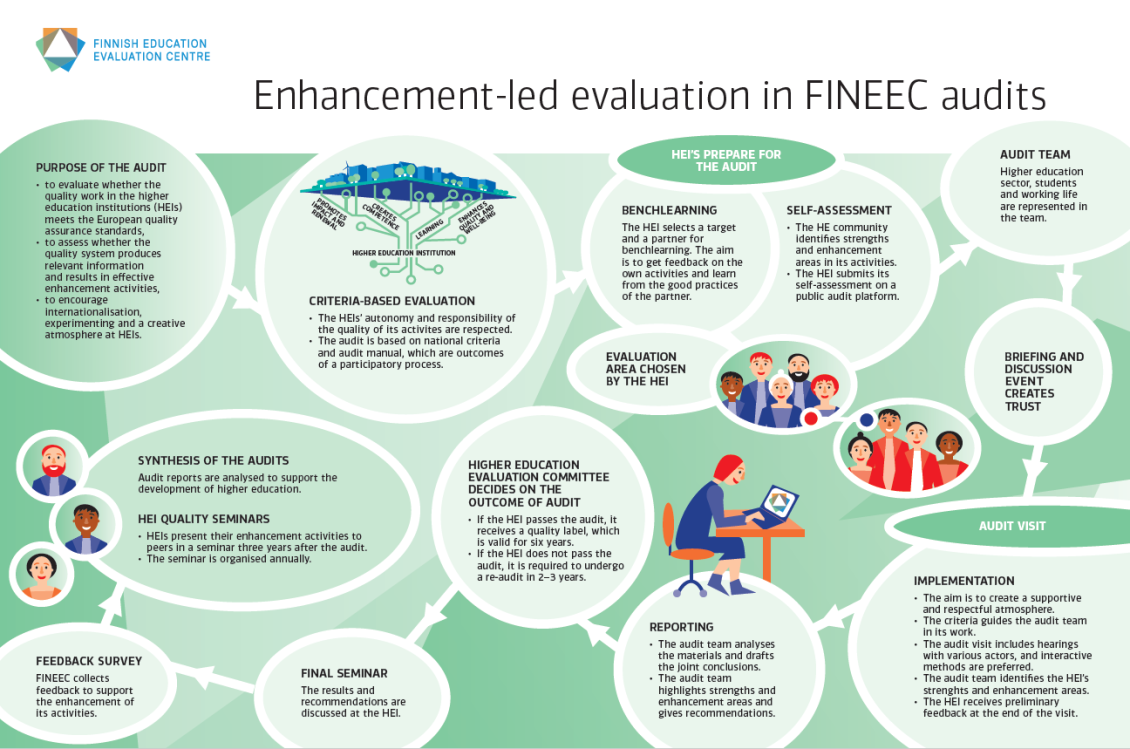3rd cycle: Audits of higher education institutions 2018–2024
FINEEC's audit framework was renewed for the third cycle of audits (2018–2024). The FINEEC audits had a special emphasis on the student-centred approach in education and the societal impact of higher education institutions' (HEIs) activities. The third cycle of audits ended 2024.
Purpose of FINEEC audits in the 3rd cycle
- to evaluate whether the quality work in the HEI meets the European quality assurance standards,
- to assess whether the quality system produces relevant information for the implementation of the strategy and the continuous development of the HEI's activities, and whether it results in effective enhancement activities,
- to encourage internationalisation, experimenting and a creative atmosphere at HEIs, and
- to accumulate open and transparent information on quality work at Finnish HEIs.
Central premise and focus
A central premise in the planning of the audit framework was the Standards and Guidelines for Quality Assurance in European Higher Education Area (ESG), which emphasises competence-based, student-centred and research-based approach in education. In the student-centred approach, students are encouraged to take an active role in the learning process.
Another central premise in the audits continued to be the autonomy of HEIs to develop their quality systems according to their own needs and goals. The autonomy and strategic development of HEIs was supported in the audit by offering HEIs the possibility to select one of the areas of evaluation as well as a benchlearning target.
The audit framework emphasised the impact of the HEI's activities as part of the education, research and artistic activities.
FINEEC audits cover all the activities of the HEI
. The FINEEC audits cover all the activities of the HEI. The focus of the audit in the third cycle was on the procedures used by the HEI to maintain and enhance the quality of its activities, which was assessed in four evaluation areas (see the Audit manual for higher education institutions 2019-2024).
The outcome of each audit was decided by the Higher Education Evaluation Committee, members of which are representatives of universities and universities of applied sciences, students and work life.
New methods and features in the 3rd cycle audits
Benchlearning was used as a method in the audit. The purpose of benchlearning was to receive feedback on the own organisation’s activities and to learn from the good practices of another organisation.
The audits included the opportunity of being awarded the Quality Label for Excellence. In order to qualify for the Quality Label for Excellence, the HEI had to provide evidence of exceptionally high-quality enhancement activities in connection with the evaluation area in question and criteria of excellence.
The audit process was also updated by introducing a digital audit platform, which functioned as a template for the self-assessment and the audit report.
Quality labels
Register of audited higher education institutions
Higher education institutions awarded with Quality Label for Excellence
Manual and process descriptions
Audit manual for higher education institutions 2019-2024
Quality Label for Excellence - procedure and criteria
Complaints and appeals procedure
Principles of online implementation 2020-2024 (addendum to the audit manual)
Audit reports
Enhancement-led principles guide the audit process
The purpose of the audit is to support the continuous development and improvement of the activities of HEIs as a whole. The audit engages staff, students and stakeholders of the HEI in recognising strengths, good practices and enhancement areas in its activities.
For further information, please contact


